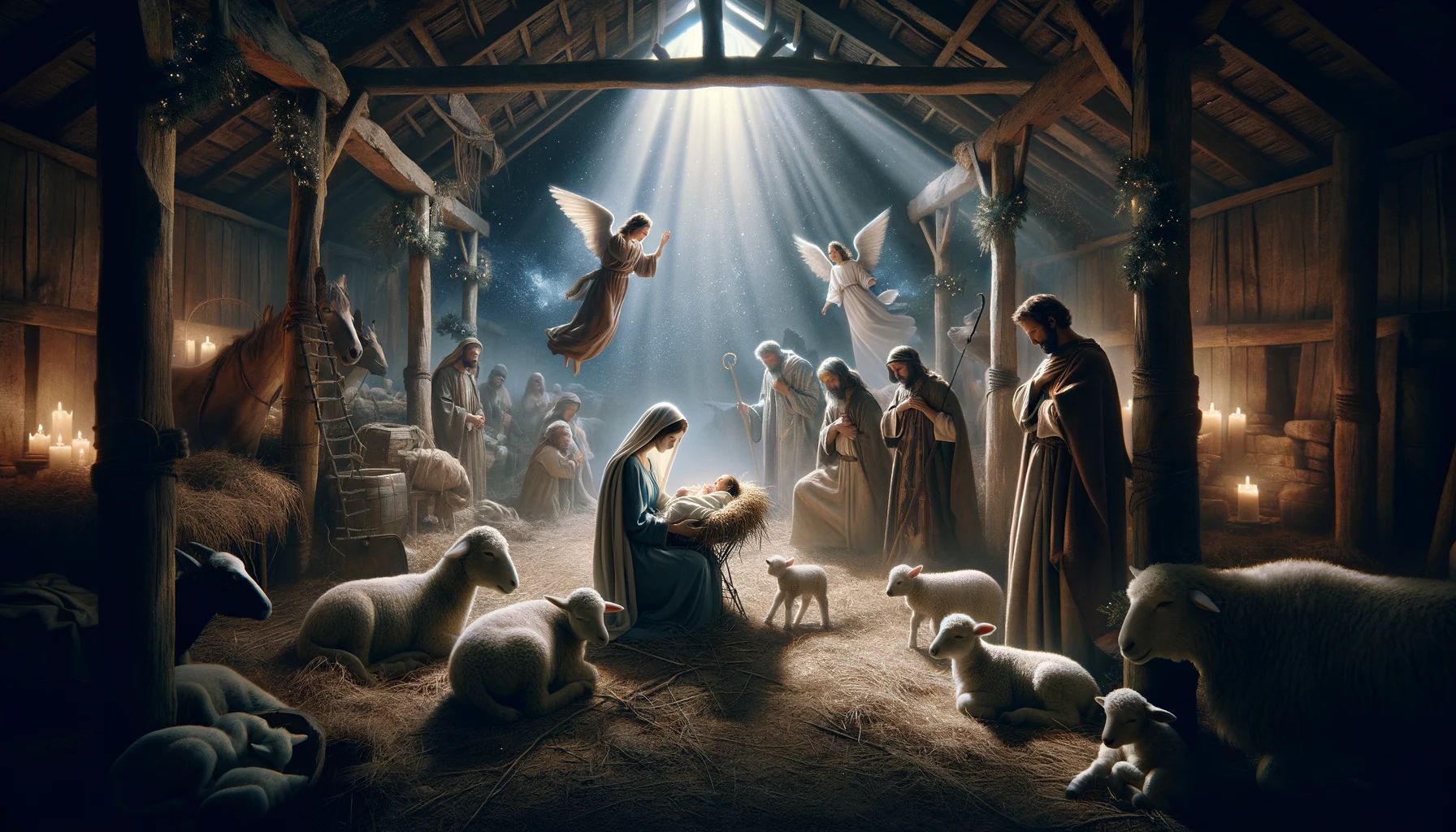Home>Special Themes>What Is First Advent Of Christ


Special Themes
What Is First Advent Of Christ
Published: February 12, 2024
Peter Smith, Editorial Director at Christian.net, combines deep insights into faith, politics, and culture to lead content creation that resonates widely. Awarded for his contributions to religious discourse, he previously headed a major organization for religious communicators, enhancing dialogue on faith's societal impacts.
Discover the significance and traditions of the first advent of Christ in this special-themed exploration of the holiday season. Uncover the history and meaning behind this sacred event.
(Many of the links in this article redirect to a specific reviewed product. Your purchase of these products through affiliate links helps to generate commission for Christian.net, at no extra cost. Learn more)
Table of Contents
Introduction
The First Advent of Christ is a pivotal event in Christian theology, marking the arrival of Jesus Christ as the prophesied Messiah. This significant milestone is celebrated during the Advent season, which encompasses the four Sundays leading up to Christmas. The term "Advent" is derived from the Latin word "adventus," meaning "coming" or "arrival," signifying the anticipation and preparation for the birth of Jesus Christ.
During this sacred period, Christians reflect on the profound significance of Christ's arrival, not only as a historical event but also as a profound spiritual truth. The First Advent symbolizes the embodiment of hope, love, joy, and peace, encapsulating the essence of the Christian faith.
As we delve into the essence of the First Advent, it is essential to recognize its profound impact on the fabric of human history and the spiritual journey of believers worldwide. The anticipation and celebration of Christ's birth serve as a poignant reminder of the divine promise fulfilled and the eternal hope bestowed upon humanity.
The First Advent of Christ holds a timeless allure, drawing believers into a deeper understanding of God's redemptive plan and the transformative power of His love. It serves as a beacon of light in a world often shrouded in darkness, offering solace and inspiration to those who seek meaning and purpose in their lives.
Throughout the centuries, the First Advent has been commemorated through various traditions, rituals, and acts of devotion, uniting believers in a shared reverence for the miraculous incarnation of Jesus Christ. This sacred observance transcends cultural and geographical boundaries, resonating with the hearts of individuals from diverse backgrounds and walks of life.
As we embark on a journey to explore the profound significance of the First Advent, let us open our hearts and minds to the timeless truths and enduring grace encapsulated within this sacred event. The First Advent beckons us to embrace the promise of redemption, to rejoice in the presence of Emmanuel, "God with us," and to seek a deeper connection with the divine source of all life and love.
Read more: What Is First Advent
The Meaning of Advent
The term "Advent" holds profound significance within the Christian faith, encapsulating a rich tapestry of spiritual symbolism and theological depth. At its core, Advent represents a period of expectant waiting and preparation for the celebration of the birth of Jesus Christ. This sacred season spans the four Sundays leading up to Christmas, serving as a poignant reminder of the anticipation and hope that characterized the arrival of the long-awaited Messiah.
Advent embodies a sense of eager longing and joyful anticipation, inviting believers to reflect on the profound implications of Christ's incarnation. It serves as a time of spiritual introspection, prompting individuals to cultivate a spirit of mindfulness and reverence as they await the commemoration of the Nativity.
Central to the essence of Advent is the theme of light amidst darkness. As the world grapples with the shadows of uncertainty and turmoil, the Advent season heralds the arrival of the ultimate light-bringer, Jesus Christ. This symbolism is often represented through the lighting of Advent candles, each one illuminating the path towards the fulfillment of divine promises and the dawning of a new era of hope and redemption.
Moreover, Advent encompasses the virtues of faith, hope, love, and joy, infusing the hearts of believers with a renewed sense of purpose and spiritual vitality. It serves as a time of rekindling the flames of faith and nurturing a deep sense of expectancy for the fulfillment of God's redemptive plan.
The observance of Advent also underscores the concept of preparation, both in a practical and spiritual sense. It calls upon individuals to engage in intentional acts of reflection, prayer, and contemplation, as they prepare their hearts to receive the transformative message of Christ's birth. This season of preparation extends beyond the external trappings of the holiday season, urging believers to cultivate a spirit of inner readiness to embrace the profound truths embodied in the Incarnation.
In essence, the meaning of Advent transcends mere historical commemoration; it beckons believers to embark on a profound journey of spiritual renewal and awakening. It serves as a poignant reminder of the enduring promise of Emmanuel, "God with us," and the timeless significance of Christ's arrival as the embodiment of divine love and grace.
As we immerse ourselves in the rich tapestry of Advent, let us embrace the profound significance of this sacred season, allowing its timeless truths to illuminate our hearts and minds with the radiant hope and enduring promise of the First Advent of Christ.
The Prophecies of the First Advent
The prophecies foretelling the First Advent of Christ are deeply rooted in the sacred scriptures of the Old Testament, serving as a profound testament to the divine orchestration of human history. These prophetic utterances, spanning centuries and articulated through the voices of revered prophets, heralded the imminent arrival of the long-awaited Messiah, Jesus Christ.
One of the most renowned prophecies concerning the First Advent is found in the book of Isaiah, where the prophet Isaiah, inspired by the divine spirit, proclaimed, "Therefore the Lord himself will give you a sign: The virgin will conceive and give birth to a son, and will call him Immanuel" (Isaiah 7:14, NIV). This prophetic declaration, uttered centuries before the birth of Christ, foreshadowed the miraculous conception and birth of Jesus, affirming His divine nature and redemptive mission.
Furthermore, the book of Micah contains a prophecy that pinpointed the birthplace of the Messiah, declaring, "But you, Bethlehem Ephrathah, though you are small among the clans of Judah, out of you will come for me one who will be ruler over Israel, whose origins are from of old, from ancient times" (Micah 5:2, NIV). This prophetic revelation not only identified the precise location of Christ's birth but also underscored His eternal origins and sovereign authority as the promised King and Savior.
The prophecies of the First Advent extend beyond the realm of birth and lineage, encompassing the redemptive mission of the Messiah. The book of Isaiah vividly portrays the suffering and sacrificial role of the anticipated Messiah, stating, "But he was pierced for our transgressions, he was crushed for our iniquities; the punishment that brought us peace was on him, and by his wounds we are healed" (Isaiah 53:5, NIV). This prophetic imagery foreshadowed the profound atoning work of Christ, highlighting the redemptive significance of His sacrificial death and resurrection.
Moreover, the prophetic scriptures in the Old Testament abound with vivid descriptions of the Messiah's earthly ministry, His divine nature, and the transformative impact of His redemptive mission. These prophecies, meticulously woven into the fabric of ancient scriptures, served as a beacon of hope and assurance for generations of believers, affirming the unerring faithfulness of God in fulfilling His promises through the advent of Jesus Christ.
As we contemplate the profound significance of the prophecies of the First Advent, we are invited to marvel at the divine precision and overarching providence encapsulated within these ancient utterances. The fulfillment of these prophecies in the life, ministry, and redemptive work of Jesus Christ stands as a testament to the timeless veracity of God's word and the enduring promise of hope and salvation heralded by the First Advent.
The Fulfillment of the First Advent
The fulfillment of the First Advent stands as a testament to the profound orchestration of divine providence and the culmination of centuries-old prophecies. In the small town of Bethlehem, amidst humble surroundings, the long-awaited promise of the Messiah's arrival was realized in the birth of Jesus Christ. This pivotal moment in human history marked the convergence of the sacred and the secular, as the eternal Word became flesh and dwelt among humanity.
The circumstances surrounding the Nativity narrative resonate with profound symbolism, underscoring the paradoxical nature of Christ's incarnation. Born in a manger, amidst the simplicity of a stable, Jesus entered the world as the embodiment of humility and grace. This extraordinary event defied human expectations, affirming the divine principle that God's redemptive plan unfolds in ways that transcend human understanding.
The fulfillment of the First Advent not only encompassed the miraculous birth of Christ but also heralded the arrival of the promised Savior, the Prince of Peace, and the Light of the World. The angelic proclamation to the shepherds encapsulated the profound significance of this divine arrival, declaring, "Do not be afraid. I bring you good news that will cause great joy for all the people. Today in the town of David a Savior has been born to you; he is the Messiah, the Lord" (Luke 2:10-11, NIV). This celestial announcement reverberated with the resounding truth of God's redemptive plan fulfilled through the birth of Jesus Christ.
Furthermore, the fulfillment of the First Advent extended beyond the Nativity scene, encompassing the earthly ministry, sacrificial death, and triumphant resurrection of Jesus. His life exemplified the embodiment of divine love, compassion, and truth, offering a transformative message of hope and redemption to all who encountered Him. The profound impact of His teachings, miracles, and ultimate sacrifice reverberated throughout human history, shaping the spiritual landscape of the world and offering a pathway to reconciliation with God.
The fulfillment of the First Advent serves as a timeless testament to the unyielding faithfulness of God in fulfilling His promises. It stands as a beacon of hope and assurance, inviting believers to embrace the profound significance of Christ's arrival as the fulfillment of ancient prophecies and the embodiment of God's redemptive love for humanity. As we contemplate the fulfillment of the First Advent, we are beckoned to marvel at the enduring grace and transformative power encapsulated within this sacred event, inviting us to embrace the eternal promise of hope and salvation heralded by the birth of Jesus Christ.
The Significance of the First Advent
The First Advent of Christ holds profound significance, transcending the boundaries of time and space to resonate with the hearts of believers across generations. At its core, the significance of the First Advent lies in its transformative impact on human history and the eternal destiny of humanity. This sacred event serves as a poignant reminder of the unyielding faithfulness of God in fulfilling His promises and the enduring grace extended to humanity through the birth of Jesus Christ.
The First Advent stands as a testament to the divine initiative of God in bridging the chasm between the sacred and the secular, as the eternal Word took on human form and entered into the tapestry of human experience. This extraordinary act of incarnation embodies the essence of divine love and compassion, offering a pathway to reconciliation and redemption for all who embrace the message of Christ's birth.
Moreover, the significance of the First Advent is intricately woven into the fabric of Christian theology, encapsulating the foundational truths of the faith. The birth of Jesus Christ heralded the arrival of the promised Messiah, the fulfillment of ancient prophecies, and the dawning of a new era of hope and salvation. His life, teachings, sacrificial death, and triumphant resurrection serve as the cornerstone of the Christian faith, offering a profound message of reconciliation, restoration, and eternal life.
The First Advent also holds immense significance in illuminating the timeless virtues of faith, hope, love, and joy. It serves as a beacon of hope in a world often shrouded in darkness, inviting believers to embrace the transformative power of Christ's arrival as the ultimate manifestation of God's love for humanity. The Nativity narrative resonates with the enduring promise of Emmanuel, "God with us," offering solace and inspiration to all who seek meaning and purpose in their lives.
Furthermore, the significance of the First Advent extends beyond historical commemoration, inviting believers to embark on a profound journey of spiritual renewal and awakening. It beckons individuals to cultivate a spirit of expectancy and reverence, nurturing a deep sense of connection with the divine source of all life and love. The observance of the First Advent serves as a poignant reminder of the eternal promise of hope and salvation, inviting believers to embrace the transformative message of Christ's birth with open hearts and minds.
In essence, the significance of the First Advent encapsulates the enduring grace, profound love, and transformative power of the divine message embodied in the birth of Jesus Christ. It beckons believers to embrace the eternal promise of redemption, to rejoice in the presence of Emmanuel, and to seek a deeper connection with the timeless truths encapsulated within this sacred event. As we contemplate the significance of the First Advent, we are invited to marvel at the enduring impact of Christ's arrival, allowing its radiant hope and transformative promise to illuminate our hearts and minds with the timeless truths of the Christian faith.















